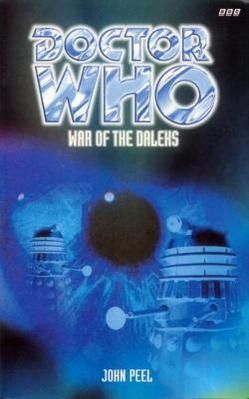 War of the Daleks by John PeelIn Brief: Daleks. Thals. Spider-Daleks. Davros. Battle-Daleks. Evil Plans. Things go BOOM. Daleks daleks daleks. And then they all go home.It would be very easy to just state that War of the Daleks is complete rubbish and move on. Actually I'd actually *like* to just state that War or the Daleks is rubbish and move on. The problem is that it's not *quite* awful enough to hate, I more just feel a bit of pity for it. Author John Peel obviously has a serious literary hard-on for all things Dalek, unfortunately the result is just too much hot and messy textual self-love.However despite being well below-average the book is not boring. After a long-winded prelude detailing a Thal/Dalek battle, the Doctor and Sam find themselves on a garbage-ship in space, the Quetzel. Initially it seems like the story will be about the crew of this ship being caught up in a massive space-war, with lots of macho battles and guns. With flat characterisation and Peel's rather terrible prose style the first act of the book is rather painful.However a recovered pod on board The Quetzel turns out to contain one Davros, creator of the Daleks.And so the insanity begins.First Davros/The Doctor/Sam are captured by the Thals. Then they're captured by the Daleks. Then they're taken to Thal/Dalek home-work Skaro to meet with the "Dalek Prime".Why don't the Daleks just exterminate arch-enemy The Doctor on sight? Who knows?!!Well so that the Dalek Prime can spend a chapter recounting a nonsensical plot that somehow kept Skaro from being destroyed in 1988's "Remembrance of the Daleks".Of courseThen there was something about finding out about which Daleks were still loyal to Davros......a battle on Skaro......stuff blew up......capture, escape, captured......bombs in the Tardis......a disguised Dalek in the Tardis......sea-Slythers......Davros ranting......The Dalek Prime ranting...andandand...It just doesn't make any sense. Not a bit of it.There is no plot or really even purpose to War of the Daleks. It's essentially John Peel's love-letter to the Dlakes. The problem is that what Peel wants is the Daleks as they were in 1960s comic-strips rather than what was ever seen on television.
War of the Daleks by John PeelIn Brief: Daleks. Thals. Spider-Daleks. Davros. Battle-Daleks. Evil Plans. Things go BOOM. Daleks daleks daleks. And then they all go home.It would be very easy to just state that War of the Daleks is complete rubbish and move on. Actually I'd actually *like* to just state that War or the Daleks is rubbish and move on. The problem is that it's not *quite* awful enough to hate, I more just feel a bit of pity for it. Author John Peel obviously has a serious literary hard-on for all things Dalek, unfortunately the result is just too much hot and messy textual self-love.However despite being well below-average the book is not boring. After a long-winded prelude detailing a Thal/Dalek battle, the Doctor and Sam find themselves on a garbage-ship in space, the Quetzel. Initially it seems like the story will be about the crew of this ship being caught up in a massive space-war, with lots of macho battles and guns. With flat characterisation and Peel's rather terrible prose style the first act of the book is rather painful.However a recovered pod on board The Quetzel turns out to contain one Davros, creator of the Daleks.And so the insanity begins.First Davros/The Doctor/Sam are captured by the Thals. Then they're captured by the Daleks. Then they're taken to Thal/Dalek home-work Skaro to meet with the "Dalek Prime".Why don't the Daleks just exterminate arch-enemy The Doctor on sight? Who knows?!!Well so that the Dalek Prime can spend a chapter recounting a nonsensical plot that somehow kept Skaro from being destroyed in 1988's "Remembrance of the Daleks".Of courseThen there was something about finding out about which Daleks were still loyal to Davros......a battle on Skaro......stuff blew up......capture, escape, captured......bombs in the Tardis......a disguised Dalek in the Tardis......sea-Slythers......Davros ranting......The Dalek Prime ranting...andandand...It just doesn't make any sense. Not a bit of it.There is no plot or really even purpose to War of the Daleks. It's essentially John Peel's love-letter to the Dlakes. The problem is that what Peel wants is the Daleks as they were in 1960s comic-strips rather than what was ever seen on television.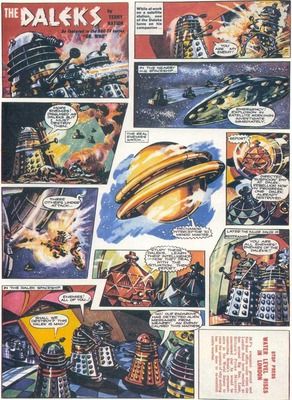 The comic-strips in question.This isn't a book finding a new way to use the Daleks in Doctor Who fiction (and remember they never appeared in a New Adventure), this is John Peel spending 200 pages re-writing almost every previous Dalek story so that his vision of what they "should be" can come to pass. Unfortunately his vision is a group of characters meant for a mid-60s comic-book, not a late-90s novel. As much as I complained that Terrance Dicks was trying to force the series back to the early-70s in The Eight Doctors at least he's a semi-competent writer (most of the time) who actually worked on the show proper. John Peel just isn't up to the task. While none of the ideas in War of the Daleks are particularly poor (other than the desire to re-write the past) the author had nowhere near enough ability or talent to putting a comic-book sensibility in a book. The result is just a huge mess.Despite War of the Daleks being a poor entry in the series I'm still enjoying reading the Eighth Doctor books. However unfortunately the quality so far has been well below that of the New Adventures, despite that series' occasional fumble. There's been too much of a move into the past (every book so far has included an old aspect/character from the show) with an almost seemingly deliberate reaction to the New Adventures shifting Doctor Who away from what it was when on TV. Unfortunately the problem is that removing these changes forces the series to go backwards, which is not a good thing for Doctor Who. Again the series needs to find its way forward, and to stop relying on random authors who seem to only want to rely on nostalgia for their stories.
The comic-strips in question.This isn't a book finding a new way to use the Daleks in Doctor Who fiction (and remember they never appeared in a New Adventure), this is John Peel spending 200 pages re-writing almost every previous Dalek story so that his vision of what they "should be" can come to pass. Unfortunately his vision is a group of characters meant for a mid-60s comic-book, not a late-90s novel. As much as I complained that Terrance Dicks was trying to force the series back to the early-70s in The Eight Doctors at least he's a semi-competent writer (most of the time) who actually worked on the show proper. John Peel just isn't up to the task. While none of the ideas in War of the Daleks are particularly poor (other than the desire to re-write the past) the author had nowhere near enough ability or talent to putting a comic-book sensibility in a book. The result is just a huge mess.Despite War of the Daleks being a poor entry in the series I'm still enjoying reading the Eighth Doctor books. However unfortunately the quality so far has been well below that of the New Adventures, despite that series' occasional fumble. There's been too much of a move into the past (every book so far has included an old aspect/character from the show) with an almost seemingly deliberate reaction to the New Adventures shifting Doctor Who away from what it was when on TV. Unfortunately the problem is that removing these changes forces the series to go backwards, which is not a good thing for Doctor Who. Again the series needs to find its way forward, and to stop relying on random authors who seem to only want to rely on nostalgia for their stories.
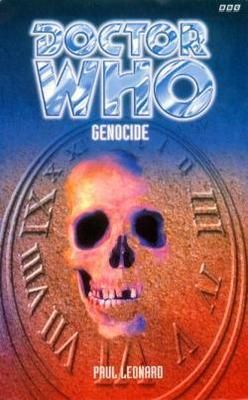 Genocide by Paul Leonard
In Brief: The Human-race has been wiped from history and Earth is now inhabited by the peaceful Tractites.
Paul Leonard can turn out some more than half-decent prose. Even as Genocide loses steam in its second half the quality of Leonard's writing keeps the pages turning. The Doctor and Sam land on Earth but it's not the planet we know as a race known as Tractites (horses with arms) now live there, and have done so for millions of years. With history having somehow been changed The Doctor has to both find the cause and ultimately make the decision of which version of reality will be allowed to exist.
The strongest part of Genocide is the first act, as we get a tour of a Tractite-inhabited Earth and the set-up for the moral issues that are to come. Leonard is a good scene-setter, he's able to really give a good sense of place and location. Also his characterisation is decent as he makes sure that the various aliens and humans encountered have interesting personalities. They aren't just blobs (or horsies rather) with funny names.
Add into the mix some out-of-time paleontologists, a crazed nutter who wants to wipe out history and one Jo Grant. Jo is brought into the story via a sub-plot set in the present-day (well, late-90s) Africa, where the paleontologists have discovered anomalies in the fossil-record and make a call to her to come and help. Unfortunately Jo doesn't really add much to the book and there's a sense that Leonard might have been stuck with a brief to include her but couldn't come up with a good use of the character. Also this 1990s version of Jo completely lacks any sense of the character's normal personality, with this older single-mother version being somewhat bland.
Still, despite the misuse of Jo much of Genocide is very good, with the revelations around the change of history being slowly given out, making sure that the reader's interest is maintained. Unfortunately about half-way through, with a change in location to pre-historic Africa that the book suffers a bit. There's not quite enough story to maintain this part of the book, and there's a fair bit of of padding as characters encounter assorted beasts and dangers. While the book never becomes terrible it does become a bit of a slog at this point.
Also, the central question of choosing between the Tractites and Humans in regards to the eventual fate of the Earth becomes somewhat muddled. With it eventuating that the Tractite-future would result in the destruction of the universe due to various temporal-imbalances there's never really a choice for The Doctor or other characters to face. They *have* to ensure that the human race survives. Even though the humans will eventually cause the destruction of the Tractite home-world (with the surviving Tractites using a "time tree" and going back in time to wipe out humanity before it starts, timey-wimey) it's obviously a better option than everything being wiped out.
Genocide could have been stronger if the Tractites could have actually had their future; it would have had a greater impact. As is the later part of the book just feels like The Doctor & Co. going through the motions until the proper future is restored. Like in The Bodysnatchers The Doctor resolves a situation without really having had to live with the repercussions of his actions.
But overall Genocide was actually pretty good, despite flaws. It's padded, but not horribly so and there are some clever ideas at work (especially a bit where a message for Sam is left in some million-year old rock, however unfortunately it doesn't say HELLO SWEETIE). With another edit (perhaps removing 50 pages or so) and better use of Jo Grant the book could have been great rather than just above average.
As The Eighth Doctor Adventures, now that I'm 4 books into the series, remains a difficult subject to form an opinion about. Much like The New Adventures had to cope with the shadow of the TV-show these books are trying to find a different direction to the previous series. While the realisation of The Doctor is getting stronger, with authors becoming more comfortable with him being more the man of action than before the same can't be said for Ms. Sam Jones. While not a horrible character she unfortunately has yet to improve on being a rather spoiled and petulant teenager.
With the New Adventures having the more mysterious and manipulative 7th-Doctor the other regulars (Ace, Benny, Chris, Roz) tended to carry much of the books. With the 8th-Doctor not having the pre-planning nature of his predecessor he ends up being much more at the centre of events and much more the main protagonist of the series. So with The Doctor now *doing* more it means that the companion's part is reduced, with the result that Sam has yet to really have a chance to do much other than cause problems and add complications. As such the character ends up being a bit of an albatross around the neck of the series. While she's obviously an effort to move away from the "tougher" companions of the New Adventures the result is still too much like a step backwards.
But still, Genocide is a huge step-up in quality from The Bodysnatchers and is a sign that hopefully the series is finding its feet.
Genocide by Paul Leonard
In Brief: The Human-race has been wiped from history and Earth is now inhabited by the peaceful Tractites.
Paul Leonard can turn out some more than half-decent prose. Even as Genocide loses steam in its second half the quality of Leonard's writing keeps the pages turning. The Doctor and Sam land on Earth but it's not the planet we know as a race known as Tractites (horses with arms) now live there, and have done so for millions of years. With history having somehow been changed The Doctor has to both find the cause and ultimately make the decision of which version of reality will be allowed to exist.
The strongest part of Genocide is the first act, as we get a tour of a Tractite-inhabited Earth and the set-up for the moral issues that are to come. Leonard is a good scene-setter, he's able to really give a good sense of place and location. Also his characterisation is decent as he makes sure that the various aliens and humans encountered have interesting personalities. They aren't just blobs (or horsies rather) with funny names.
Add into the mix some out-of-time paleontologists, a crazed nutter who wants to wipe out history and one Jo Grant. Jo is brought into the story via a sub-plot set in the present-day (well, late-90s) Africa, where the paleontologists have discovered anomalies in the fossil-record and make a call to her to come and help. Unfortunately Jo doesn't really add much to the book and there's a sense that Leonard might have been stuck with a brief to include her but couldn't come up with a good use of the character. Also this 1990s version of Jo completely lacks any sense of the character's normal personality, with this older single-mother version being somewhat bland.
Still, despite the misuse of Jo much of Genocide is very good, with the revelations around the change of history being slowly given out, making sure that the reader's interest is maintained. Unfortunately about half-way through, with a change in location to pre-historic Africa that the book suffers a bit. There's not quite enough story to maintain this part of the book, and there's a fair bit of of padding as characters encounter assorted beasts and dangers. While the book never becomes terrible it does become a bit of a slog at this point.
Also, the central question of choosing between the Tractites and Humans in regards to the eventual fate of the Earth becomes somewhat muddled. With it eventuating that the Tractite-future would result in the destruction of the universe due to various temporal-imbalances there's never really a choice for The Doctor or other characters to face. They *have* to ensure that the human race survives. Even though the humans will eventually cause the destruction of the Tractite home-world (with the surviving Tractites using a "time tree" and going back in time to wipe out humanity before it starts, timey-wimey) it's obviously a better option than everything being wiped out.
Genocide could have been stronger if the Tractites could have actually had their future; it would have had a greater impact. As is the later part of the book just feels like The Doctor & Co. going through the motions until the proper future is restored. Like in The Bodysnatchers The Doctor resolves a situation without really having had to live with the repercussions of his actions.
But overall Genocide was actually pretty good, despite flaws. It's padded, but not horribly so and there are some clever ideas at work (especially a bit where a message for Sam is left in some million-year old rock, however unfortunately it doesn't say HELLO SWEETIE). With another edit (perhaps removing 50 pages or so) and better use of Jo Grant the book could have been great rather than just above average.
As The Eighth Doctor Adventures, now that I'm 4 books into the series, remains a difficult subject to form an opinion about. Much like The New Adventures had to cope with the shadow of the TV-show these books are trying to find a different direction to the previous series. While the realisation of The Doctor is getting stronger, with authors becoming more comfortable with him being more the man of action than before the same can't be said for Ms. Sam Jones. While not a horrible character she unfortunately has yet to improve on being a rather spoiled and petulant teenager.
With the New Adventures having the more mysterious and manipulative 7th-Doctor the other regulars (Ace, Benny, Chris, Roz) tended to carry much of the books. With the 8th-Doctor not having the pre-planning nature of his predecessor he ends up being much more at the centre of events and much more the main protagonist of the series. So with The Doctor now *doing* more it means that the companion's part is reduced, with the result that Sam has yet to really have a chance to do much other than cause problems and add complications. As such the character ends up being a bit of an albatross around the neck of the series. While she's obviously an effort to move away from the "tougher" companions of the New Adventures the result is still too much like a step backwards.
But still, Genocide is a huge step-up in quality from The Bodysnatchers and is a sign that hopefully the series is finding its feet.
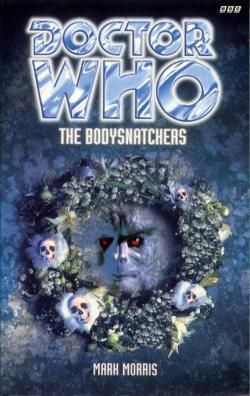 The Bodysnatchers by Mark MorrisIn Brief: Zygons + Victorian London.The Bodysnatchers is hum-drum, regular, unambitious, knows its place, doesn't think to hard, only wants to amuse, etc. While it sort of manages it's purpose of mixing an old Doctor Who monster (The Zygons from 1975's "Terror of the Zygons") in a fan-favourite setting (Victorian England, including the return of Professor Litefoot from 1976's "The Talons of Weng-Chiang") and even manages to include a plot (almost) the result is seriously lacking. However we're not back down to the depths of The Eight Doctors but it's completely unambitious, not doing anything to push the boundaries of being a "traditional Doctor Who story".The result is rather dull.Very rarely in the history of the TV show are there examples of the production team *not* trying something new or going in a new direction with a story. The series has always been marked by the attitude of "let's see what we can try *this* week", for better or for worse. So having a book which is so definitively tasked with providing a "standard Doctor Who tale" is somewhat odd. But then we're still in the days reacting to the "it wasn't Doctor Who-ey enough" New Advenstures.The suspicion is though that as the 8th-Doctor books were being published directly by the BBC the decision has been made to use the old televised adversaries that Virgin Publishing's New Adventures weren't able to use due to rights issues. While it's an understandable technique to create a demarcation between that series and the BBC-Books version here nothing new or interesting has been done with the returning Zygons.
The Bodysnatchers by Mark MorrisIn Brief: Zygons + Victorian London.The Bodysnatchers is hum-drum, regular, unambitious, knows its place, doesn't think to hard, only wants to amuse, etc. While it sort of manages it's purpose of mixing an old Doctor Who monster (The Zygons from 1975's "Terror of the Zygons") in a fan-favourite setting (Victorian England, including the return of Professor Litefoot from 1976's "The Talons of Weng-Chiang") and even manages to include a plot (almost) the result is seriously lacking. However we're not back down to the depths of The Eight Doctors but it's completely unambitious, not doing anything to push the boundaries of being a "traditional Doctor Who story".The result is rather dull.Very rarely in the history of the TV show are there examples of the production team *not* trying something new or going in a new direction with a story. The series has always been marked by the attitude of "let's see what we can try *this* week", for better or for worse. So having a book which is so definitively tasked with providing a "standard Doctor Who tale" is somewhat odd. But then we're still in the days reacting to the "it wasn't Doctor Who-ey enough" New Advenstures.The suspicion is though that as the 8th-Doctor books were being published directly by the BBC the decision has been made to use the old televised adversaries that Virgin Publishing's New Adventures weren't able to use due to rights issues. While it's an understandable technique to create a demarcation between that series and the BBC-Books version here nothing new or interesting has been done with the returning Zygons.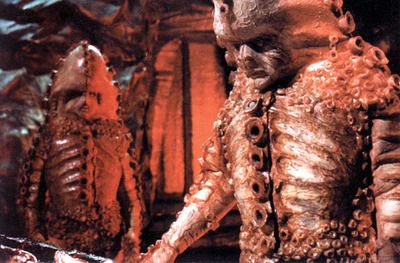 "Or maybe we're just perfect as is?" Um, no...The Zygons themselves, while a well-remembered monster, aren't actually interesting in of themselves. They're just another race of baddies aiming for conquest and unlimited rice-pudding. As such they're really no different than the Ice Warriors, Cybermen, Kraals, etc. With The Bodysnatchers being a book and all and not having the benefit of effective design and creepy voices they just become a bland lot of antagonists.Also, The Doctor and Sam are still suffering from being underdeveloped. While the book just about gets away with it for The Doctor (since The 8th-version is deliberately more a man of action (scuba diving!) compared to his predecessor), Sam just just isn't working. There's no depth to her character, other than being a generic middle-class teenager with an irritating sarcastic streak. While the series has had "light" companions before it's a big demerit for these books in comparison to previous characters like Benny, Roz and (sometimes) Chris.Although at the end of this book there is an odd passage that foreshadows that Sam may be encoutering a somewhat dark future, so perhaps this is all deliberate.He says hopefully.The Bodysnatchers however isn't totally a bad book. Mark Morris is able to string his sentences together in a decent enough way, even if the plot is rather weak (People acting weird, oh they're Zygons! The Zygons have a ship under the Thames, with giant monsters! It all goes BOOM!). But still, it's little more than a workmanlike endeavour.There were also a few parts of the book that seriously irked. The ending is far too rushed, despite having a huge amount of lead-up (aka faffing-about). Minor characters disappear rather abruptly without any sort of closure and there several aspects of the book (particularly a sub-plot concerning bodies being stolen from a graveyard and related characters) which end up having little to do with the main story. But the biggest problem I had was how The Doctor actually deals with The Zygons. *spoilers* His plan of using a sedative to put them to sleep and transport their shop to another planet goes horribly wrong with the result being the painful death of almost every Zygon. However other than his saying "sorry" once there are no repercussions, he just bounces off to his next adventure. It's just completely wrong for the character, and to have it treated so lightly is uncomfortable.All of these factors lead to the sense that the book needed a major edit prior to publication. But I'll cut The Bodysnatchers some slack since this is a series obviously trying to find its feet, much the same as with the early New Adventures. Hopefully things improve soon.
"Or maybe we're just perfect as is?" Um, no...The Zygons themselves, while a well-remembered monster, aren't actually interesting in of themselves. They're just another race of baddies aiming for conquest and unlimited rice-pudding. As such they're really no different than the Ice Warriors, Cybermen, Kraals, etc. With The Bodysnatchers being a book and all and not having the benefit of effective design and creepy voices they just become a bland lot of antagonists.Also, The Doctor and Sam are still suffering from being underdeveloped. While the book just about gets away with it for The Doctor (since The 8th-version is deliberately more a man of action (scuba diving!) compared to his predecessor), Sam just just isn't working. There's no depth to her character, other than being a generic middle-class teenager with an irritating sarcastic streak. While the series has had "light" companions before it's a big demerit for these books in comparison to previous characters like Benny, Roz and (sometimes) Chris.Although at the end of this book there is an odd passage that foreshadows that Sam may be encoutering a somewhat dark future, so perhaps this is all deliberate.He says hopefully.The Bodysnatchers however isn't totally a bad book. Mark Morris is able to string his sentences together in a decent enough way, even if the plot is rather weak (People acting weird, oh they're Zygons! The Zygons have a ship under the Thames, with giant monsters! It all goes BOOM!). But still, it's little more than a workmanlike endeavour.There were also a few parts of the book that seriously irked. The ending is far too rushed, despite having a huge amount of lead-up (aka faffing-about). Minor characters disappear rather abruptly without any sort of closure and there several aspects of the book (particularly a sub-plot concerning bodies being stolen from a graveyard and related characters) which end up having little to do with the main story. But the biggest problem I had was how The Doctor actually deals with The Zygons. *spoilers* His plan of using a sedative to put them to sleep and transport their shop to another planet goes horribly wrong with the result being the painful death of almost every Zygon. However other than his saying "sorry" once there are no repercussions, he just bounces off to his next adventure. It's just completely wrong for the character, and to have it treated so lightly is uncomfortable.All of these factors lead to the sense that the book needed a major edit prior to publication. But I'll cut The Bodysnatchers some slack since this is a series obviously trying to find its feet, much the same as with the early New Adventures. Hopefully things improve soon.
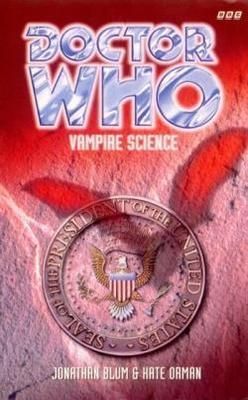 Vampire Science by Jonathan Blum and Kate OrmanIn Brief: San Francisco. 1997. Vampires. Slaying.Vampire Science is thankfully good, which is notable after the painful The Eight Doctors. As it was co-written by Kate Orman, who churned out some of the highlights of the New Adventures, the increase in quality in comparison to the prose of Terrance Dicks is hardly a surprise. However I found it to be less than satisfying, there's a gap at the novel's core.This sense of something missing or rather a disjointedness mainly centred around the two lead characters, The Doctor and Sam. Nothing has quite gelled properly yet in the tales of the Eighth Doctor as he's a character that all of the authors so far haven't really been able to pin down. Of course, considering that Paul McGann only had around an hour of screen-time compared to the 12 televised stories of the 7th-Doctor it's hardly a surprise. The result though is that The Doctor, although technically less mysterious and scheming that his previous incarnation, feels much more distant. Over the course of the New Adventures the publishers were slowly able to move the character away from being an echo of Sylvester McCoy's performance into something with more depth. Unfortunately here they've not quite figured out where to go, except to have the "new" Doctor constantly be compared to the old in regards to differences in mannerisms and actions.It was understandable in The Dying Days, but it's been 3 books now of different authors struggling with the character. It's becoming noticeable.Another issue is Sam Jones. Thankfully she's much more fleshed out in Vampire Science than the light sketch of the character we got in the previous book, but again we've still no real sense of who she is and what makes her tick. We have the character-brief, that she's a blond skinny teenager and "right on!" activist with has a strong moral sense and sarcastic attitude, but no more. While there's some attempt to flesh her out through her having doubts of wanting to continue travelling with The Doctor, it doesn't feel right considering we've no understanding of her character. It's the book version of the problem with Mel, who on the show proper was just dropped into the action without any introduction. Although not nearly as annoying as she sounds, there still needs to be work done here.So as a result Vampire Science ends up being a good book unfortunately marred by it's uncomfortable use of the lead characters.Thankfully the authors are able to make up for the gap by having the rest be memorable and interesting, from medical-doctor Carolyn, who met The Doctor when young to 900-year-old head-vampire Joanna, who desperately wants to find a blood substitute so that her ilk can stop killing. The story itself isn't very plot-heavy, mainly centering around The Doctor (with the help of UNIT) trying to get to the bottom of recent vampire attacks and the resulting investigations. There are some decent quandaries-afoot as The Doctor and Joanna argue about the future of her kind, and an amusingly late-90s vibe as time is spent in a goth-club. But rather than just be overt horror this Vampire Science makes sure that the characters come first, particularly in how the react to what should be an impossibility.I don't know the exact dates but Buffy must have been on TV by the time this book was written, although nowhere near as widely known as a couple of years later.So overall the book is well-written and enjoyable but perhaps lacking in ambition. The regenerated series hasn't yet figured out how to go in a different direction the New Adventures, or even if it *can* do so. So the result, while by no means poor, feels like missed potential.Oh, and there's no reason for the American Presidential Seal to be on the cover.
Vampire Science by Jonathan Blum and Kate OrmanIn Brief: San Francisco. 1997. Vampires. Slaying.Vampire Science is thankfully good, which is notable after the painful The Eight Doctors. As it was co-written by Kate Orman, who churned out some of the highlights of the New Adventures, the increase in quality in comparison to the prose of Terrance Dicks is hardly a surprise. However I found it to be less than satisfying, there's a gap at the novel's core.This sense of something missing or rather a disjointedness mainly centred around the two lead characters, The Doctor and Sam. Nothing has quite gelled properly yet in the tales of the Eighth Doctor as he's a character that all of the authors so far haven't really been able to pin down. Of course, considering that Paul McGann only had around an hour of screen-time compared to the 12 televised stories of the 7th-Doctor it's hardly a surprise. The result though is that The Doctor, although technically less mysterious and scheming that his previous incarnation, feels much more distant. Over the course of the New Adventures the publishers were slowly able to move the character away from being an echo of Sylvester McCoy's performance into something with more depth. Unfortunately here they've not quite figured out where to go, except to have the "new" Doctor constantly be compared to the old in regards to differences in mannerisms and actions.It was understandable in The Dying Days, but it's been 3 books now of different authors struggling with the character. It's becoming noticeable.Another issue is Sam Jones. Thankfully she's much more fleshed out in Vampire Science than the light sketch of the character we got in the previous book, but again we've still no real sense of who she is and what makes her tick. We have the character-brief, that she's a blond skinny teenager and "right on!" activist with has a strong moral sense and sarcastic attitude, but no more. While there's some attempt to flesh her out through her having doubts of wanting to continue travelling with The Doctor, it doesn't feel right considering we've no understanding of her character. It's the book version of the problem with Mel, who on the show proper was just dropped into the action without any introduction. Although not nearly as annoying as she sounds, there still needs to be work done here.So as a result Vampire Science ends up being a good book unfortunately marred by it's uncomfortable use of the lead characters.Thankfully the authors are able to make up for the gap by having the rest be memorable and interesting, from medical-doctor Carolyn, who met The Doctor when young to 900-year-old head-vampire Joanna, who desperately wants to find a blood substitute so that her ilk can stop killing. The story itself isn't very plot-heavy, mainly centering around The Doctor (with the help of UNIT) trying to get to the bottom of recent vampire attacks and the resulting investigations. There are some decent quandaries-afoot as The Doctor and Joanna argue about the future of her kind, and an amusingly late-90s vibe as time is spent in a goth-club. But rather than just be overt horror this Vampire Science makes sure that the characters come first, particularly in how the react to what should be an impossibility.I don't know the exact dates but Buffy must have been on TV by the time this book was written, although nowhere near as widely known as a couple of years later.So overall the book is well-written and enjoyable but perhaps lacking in ambition. The regenerated series hasn't yet figured out how to go in a different direction the New Adventures, or even if it *can* do so. So the result, while by no means poor, feels like missed potential.Oh, and there's no reason for the American Presidential Seal to be on the cover.





